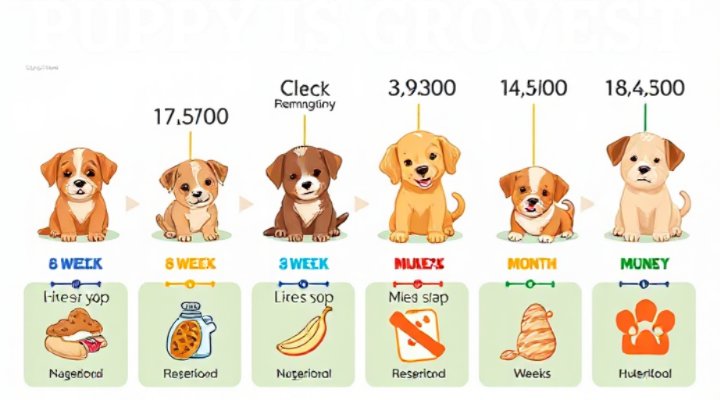Summary: Choosing the right Pedigree puppy food formula is essential for your puppy’s healthy development. This comprehensive guide will walk you through the process of selecting the perfect formula based on your puppy’s unique characteristics, including size, age, and specific health requirements. After all, proper nutrition during these formative months sets the foundation for a lifetime of health and happiness!

Understanding Your Puppy’s Nutritional Needs
Firstly, every puppy has different nutritional requirements based on their breed, size, and growth rate. For instance, large breed puppies need controlled calcium levels to support proper bone development, while small breeds require higher energy density due to faster metabolisms. Consequently, Pedigree offers specialized formulas tailored to these specific needs. I remember when I first brought home my Labrador puppy, Max; I was overwhelmed by the food choices until I learned about breed-specific nutritional requirements.
How to Choose the Right Pedigree Puppy Food Based on Size
Size is one of the most important factors when selecting puppy food. Small breed puppies, such as Chihuahuas or Pomeranians, need smaller kibble sizes and higher calorie content. On the other hand, large breeds like German Shepherds or Great Danes require formulas that support joint health and controlled growth. Pedigree provides specific options for each size category, making it easier to find the perfect match. Meanwhile, medium-sized breeds fall somewhere in between, needing balanced nutrition for steady growth.

Age-Appropriate Pedigree Puppy Food Selection
Secondly, age plays a crucial role in nutritional requirements. Puppies under six months need food rich in DHA for brain development and higher protein content for muscle growth. As they approach adulthood, their nutritional needs shift toward maintenance rather than rapid growth. Pedigree’s age-specific formulas ensure your puppy gets exactly what they need at each stage. For example, their puppy formulas contain essential nutrients like calcium and phosphorus in precise ratios for optimal development.
Special Health Considerations for Puppy Food
Some puppies have unique health needs that require special consideration. For puppies with sensitive stomachs, Pedigree offers easily digestible formulas with prebiotics. Those with skin allergies might benefit from limited ingredient options. Additionally, if your puppy is particularly active, high-energy formulas are available. Always consult with your veterinarian about any specific health concerns, as they can recommend the most appropriate sensitive stomach solutions if needed.

Reading and Understanding Pedigree Food Labels
Learning to read pet food labels is essential for making informed choices. Look for the AAFCO statement indicating the food is complete and balanced for puppies. Check the ingredient list for high-quality protein sources as the first ingredients. Furthermore, understand the guaranteed analysis to ensure proper nutrient levels. The FDA’s pet food labeling guide provides excellent information about what to look for on pet food packaging.
Transitioning to New Puppy Food
When changing your puppy’s food, always do so gradually over 7-10 days to avoid digestive upset. Start by mixing 25% new food with 75% old food, gradually increasing the proportion of new food. Monitor your puppy for any signs of intolerance, such as vomiting or diarrhea. During this transition period, ensure fresh water is always available. I found that keeping a feeding journal helped me track how Max responded to different formulas.
Feeding Schedule and Portion Control
Proper feeding amounts are just as important as choosing the right food. Follow the feeding guidelines on the package based on your puppy’s expected adult weight and current age. Most puppies need 3-4 meals per day until six months old, then can transition to 2 meals daily. Use a measuring cup rather than estimating portions to prevent overfeeding. Remember, these are guidelines – your puppy’s individual metabolism and activity level will affect their actual needs.

Common Mistakes When Choosing Puppy Food
Many pet owners make the mistake of choosing food based solely on price or brand recognition. However, the most expensive food isn’t necessarily the best for your specific puppy. Another common error is switching foods too frequently, which can cause digestive issues. Additionally, some owners over-supplement with vitamins or treats, which can unbalance the complete nutrition provided by quality puppy food. For more guidance on balanced nutrition, check out our article on puppy nutrition and training tips.
When to Consult Your Veterinarian
Always consult your veterinarian before making significant changes to your puppy’s diet, especially if they have health issues. Your vet can recommend specific formulas for conditions like food allergies, digestive problems, or growth abnormalities. They can also help you interpret feeding guidelines based on your puppy’s body condition score. Regular check-ups will ensure your puppy is growing at a healthy rate and receiving adequate nutrition from their chosen food.
Conclusion: Making the Best Choice for Your Puppy
In conclusion, choosing the right Pedigree puppy food formula requires careful consideration of your puppy’s size, age, and health needs. By understanding these factors and learning to read food labels, you can make an informed decision that supports your puppy’s healthy development. Remember that every puppy is unique, so what works for one may not work for another. Be patient, observe your puppy’s response to their food, and don’t hesitate to seek professional advice when needed. For additional resources on puppy care, visit the AVMA’s puppy feeding guidelines.
Keywords: Pedigree puppy food selection, puppy nutrition guide, dog food formulas, puppy dietary needs, choosing puppy food, Pedigree dog food varieties, puppy health nutrition
